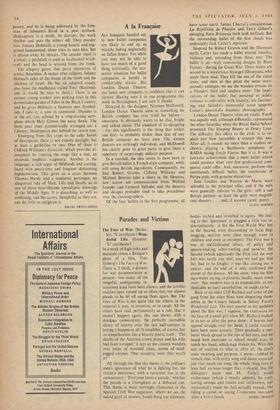Parades and Victims
The Face of 'War. (Berke- ley; 'X'certificate.) Won- derful Life. (Empire; IP certificate.)
IN a week of high jinks and musicals comes a Banquo's ghost of a film, Tore Sjoberg's The Face of War. There is, I think, a distaste for war documentaries at present—too many of the vengeful, ambiguously in-
tentioned kind have been shown, and the terrible realities have turned up so often that one almost pleads to be let off seeing them again. But The Face of War is not quite like the others, in the material it uses, in intention, or in result. All the others have said, perfunctorily as a rule, that it mustn't happen again; this one shows, with a deadpan commentary, the perfectly incredible idiocy of history over the last half-century in letting it happen at alt. It simplifies, of course, but its simplification has a bizarre poetic truth: 'The deaths of the Austrian crown prince and his wife had been avenged,' it says as the camera wanders over miles of wrecked cities, scores of mud- logged corpses. 'One wonders, were they worth it?'
All through the film the theme is the ordinary man's ignorance of what he is fighting for, the victim's innocence; with a recurrent line in the commentary: 'Everyone loves a parade,' whether the parade is a triumphant or a defeated one. This theme is most movingly illustrated in the Spanish Civil War sequences, where we see the naked grief of women, hands flung out sideways,
bodies arched and stretched in agony. My feel- ing is this 'ignorance' is plugged a little too in- discrinlinately: it fits the First World War but in the Second, even discounting its local flag- wagging, motives were clear enough, even to children and even in retrospect. The First was a war of old-fashioned idiocy, of policy and speech-making, sabre-rattling and parac'es; the Second (which admittedly the First laid the way for) was surely one that, once we had got that far, had to be fought; it was like cutting out a cancer, and the end of it only confirmed the extent of the disease. All the same, what the film says wants saying, in pictures, loudly, many times over: that modern war is as unspeakable, as un- thinkable as (say) cannibalism, or ought to be.
Back to an older Cliff Richard and some of the gang from his other films now disporting them- selves in the Canary Islands in Sidney Furie's Wonderful Life. The best answer to my quibbles about the film was, I suppose, the expression on the face of a small girl when Mr. Richard walked in to see us after the press show: if heaven had opened straight over her head, it could scarcely have been more ecstatic. Then gradually a sun- burnt blush spread to the tips of her ears; and we heard how everyone at school would want to touch her hand, which had shaken his. With this sort of reaction to what is, after all, the film's main meaning and purpose, it seems crabbed to remark that, with every song and dance sequence just that much too long, the whole thing runs at least half an hour longer than it should; that the dialogue's inane and Mr. Furie's visual exuberance (which I mostly admire), his ever- lasting swoops and zooms and restlessness, just occasionally made me feel actually seasick, like riding a camel or seeing Cirolorama too soon






























 Previous page
Previous page